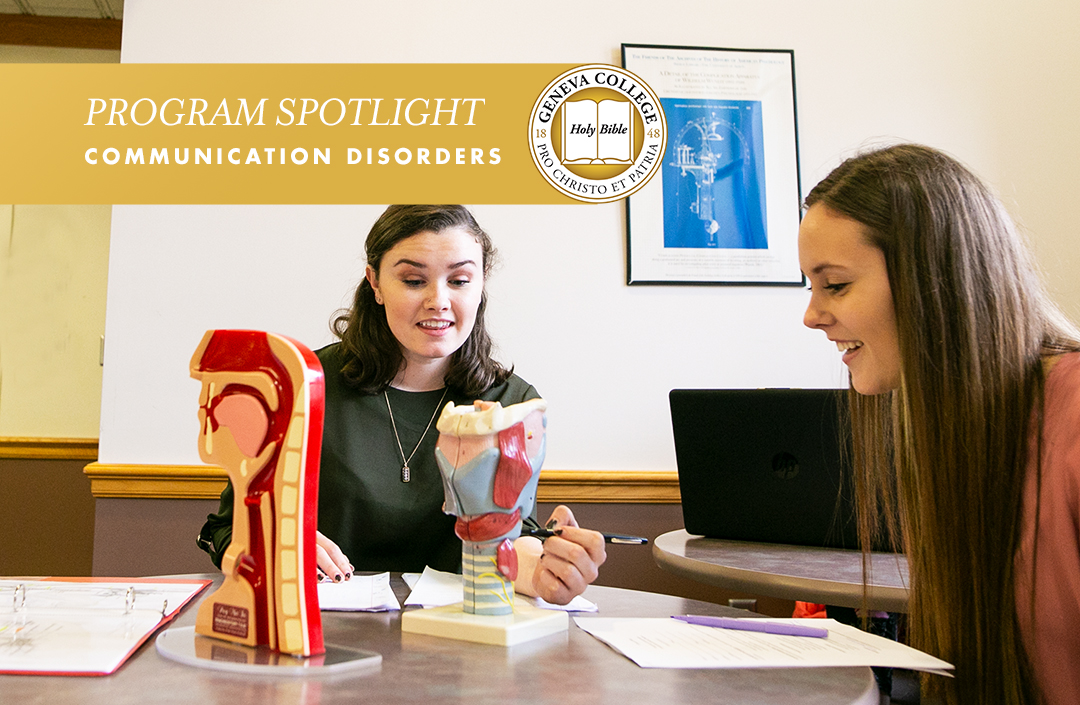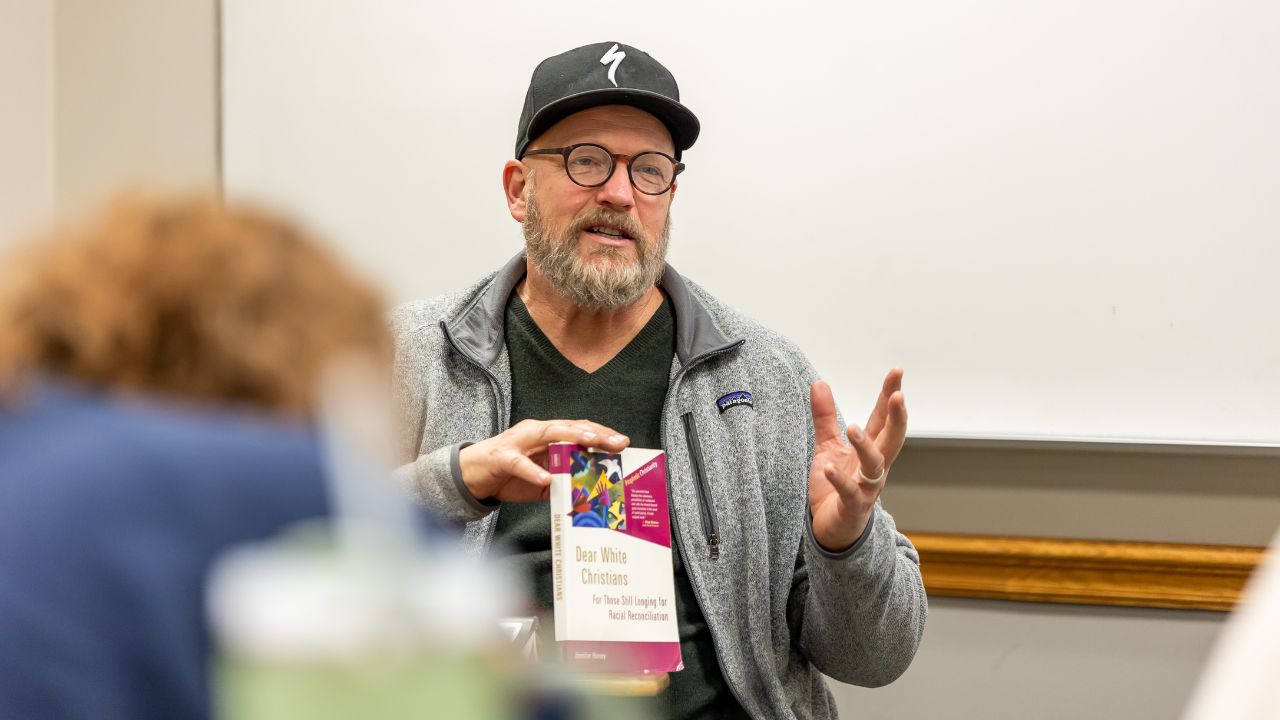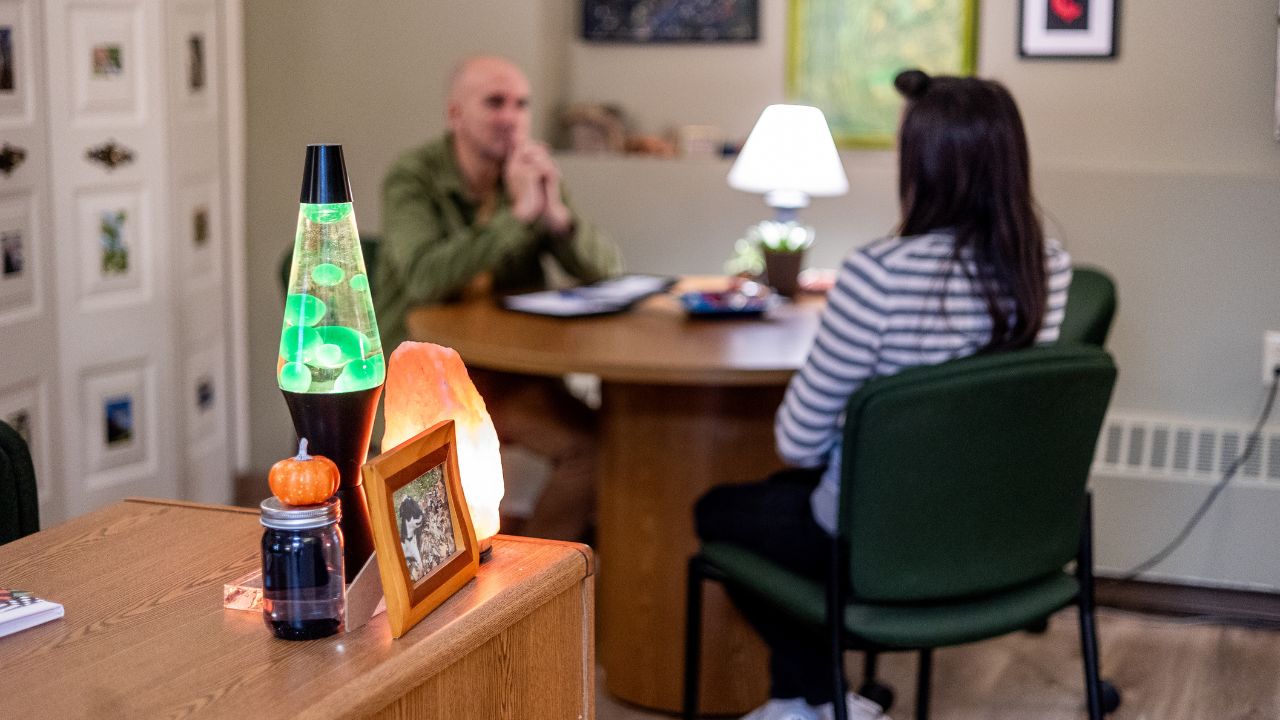
Program Spotlight: How Geneva's Communication Disorders (Speech Pathology) Program Prepares Students to Reflect the Compassion of Jesus
If you aspire to be a compassionate and skillful Christian clinician dedicated to helping others with speech disorders, Geneva’s unique approach to this field is for you. Building on your own deep and soulful relationship with Jesus Christ, you’ll study disordered human communication from a biblical perspective.
Earning your B.A. in Communication Disorders (Speech Pathology) from Geneva College’s highly respected Department of Communication prepares you for post-graduate study in clinical speech-language pathology. Your undergraduate degree program is your first step toward the training and credentials you’ll need for a career in communication disorders. This rewarding health care field lets you reflect the compassion of Jesus on a daily basis as you bring hope and healing into the lives of people with speech, language, and swallowing disorders.
Imagine how fulfilling it would be to help an elderly stroke victim recover her ability to speak. Or how grateful you’d feel to play a part in helping a young child overcome a stutter. If you, too, believe that communication is a gift from God, you’ll do everything in your power to help restore this gift to those who have lost it.
Compassionate and effective speech pathologists are in great demand. And that demand is only going to grow. The U.S. Bureau of Labor Statistics (BLS) projects an 18 percent growth rate in employment through 2026. This is much faster than the 7 percent predicted average growth rate of all occupations. In this period, an estimated 25,900 speech-language pathologist jobs should become available.
Much of this demand is due to the aging of the large baby-boom population, according to the BLS. As more of America’s older citizens experience health conditions that can cause speech or language impairments, such as strokes or dementia, speech-language pathologists will be needed to care for them.
Clinicians who have a heart for working with children will find plentiful opportunities in coming years, especially in helping children with autism to improve their ability to communicate and socialize effectively. Autism Speaks cites the Centers for Disease Control and Prevention’s (CDC) 2018 estimate on the prevalence of autism in the United States: “The new estimate represents a 15 percent increase in prevalence nationally: to 1 in 59 children, from 1 in 68 two years previous.”
The BLS also notes, “increased awareness of speech and language disorders, such as stuttering, in younger children should lead to a need for more speech-language pathologists who specialize in treating that age group.” Additionally, newborns with cleft palates or nursing difficulties are also candidates for the specialized skills of speech-language pathologists.
As medical advances continue to improve the survival rates of premature infants, victims of brain injuries, and elderly stroke, Alzheimer’s, and Parkinson’s patients—professionals will be needed to serve a variety of functions across all generations. Your ability to be a healing influence in the lives of others extends not only to your patients, but also to their families. In addition to creating and carrying out treatment plans for patients with speech or language difficulties, you’ll help their loved ones, teachers, and other support systems learn how to adjust to the presence of the communication disorder.
Career Opportunities in Communication Disorders
A degree in Communication Disorders can lead to a rewarding career in a variety of places. The BLS reports that in 2016, 40 percent of speech-language pathologists worked in schools. Most others worked in health care facilities such as hospitals, nursing homes, rehabilitation centers, and clinics. With the right credentials, you can even go into private practice, acting as a therapist or consultant to a small community of individuals.
Some common career choices in the field include:
Speech-Language Pathologist (a.k.a.: Speech Therapist)
These professionals diagnose communication, cognition, and swallowing disorders and create effective treatment plans. They practice in medical and educational settings, working with children and adults. Some speech pathologists engage in research projects to develop new ways of recognizing or treating disorders.
Audiologist
These clinicians work with adults and children who have hearing and balance difficulties. They may fit patients with hearing aids and recommend ways to prevent further hearing loss. Audiologists also provide treatment for balance disorders and tinnitus (ringing in the ears).
Special Education Teacher
These educators see to the needs of those with communication disorders, adapting lessons to meet the student’s need and developing Individualized Education Programs (IEPs) for each student. In inclusive classrooms, these instructors are often the only way students with communication disorders can communicate or learn in a traditional school environment.
With an earned master's degree, alumni of Geneva's Communication Disorders program are working at:
- SLP, Johns Hopkins Hospital
- SLP, Kindred Hospital, Louisville
- SLP, Colorado School for the Blind and Deaf
- SLP, Leetonia Exempted Village School
- SLP, College Square Elementary School
How Geneva's Department of Communication Can Prepare You for Your Professional Future
We use small class sizes in our Communication Disorders program to foster a positive, productive atmosphere that encourages collaboration and collegiality. You have ample one-to-one time with our distinguished Communication faculty.
Our Communication Department’s stated mission is “to enable students to gain the skills, insights, perspectives and knowledge to become effective, competent, wise communicators as they represent Christ in their professions, churches, communities, and families.”
As you explore speech, language, voice, swallowing, and fluency disorders and the methods of their treatment in the 57-credit-hour program, some of the classes you might take include:
- Sign Language
- Aural Rehabilitation
- Articulation/Phonological Disorders in Children
- Language Disorders in Children
- Anatomy and Physiology of Speech Mechanism
- Voice/Fluency Disorders
- Neurogenic Communication Disorders in Adults
- Speech & Hearing Science
- Culture & Communication
- Introduction to Linguistics
- Introduction to Acoustics
Earning a bachelor’s degree in Geneva’s Communication Disorders program provides you with the knowledge and skills needed for a satisfying career in the field. But it’s also excellent preparation for graduate school—a natural step in making the most of your degree.
In the past 10 years, more than 85 percent of our graduating seniors have been admitted into a communication disorders graduate program. These schools include:
- Pennsylvania State University
- Baylor University
- University of Pittsburgh
- Northwestern University
- University of Iowa
- Kent State University
- New York Medical College
If you feel called to a deeply rewarding career in speech pathology, it all begins with your Bachelor of Arts in Communication Disorders.Hard work now can pave the way for a fulfilling career as a Christian speech-language pathologist. You’ll be able to embody the compassion of Jesus in the lives of people who suffer from various speech, language, and swallowing disorders. It’s an inspiring way to satisfy your desire to be of service to others while making a profound and enriching difference in your community.
If you’d like to learn more about professions that enable you to serve wholeheartedly and faithfully in your life’s work or want to learn more about a biblically based, Christ-centered education at Geneva, we’d love to chat with you. For more information on how Geneva College can help you pursue your education goals, please phone us at 855-979-5563 or email web@geneva.edu.
Opinions expressed in the Geneva Blog are those of its contributors and do not necessarily represent the opinions or official position of the College. The Geneva Blog is a place for faculty and contributing writers to express points of view, academic insights, and contribute to national conversations to spark thought, conversation, and the pursuit of truth, in line with our philosophy as a Christian, liberal arts institution.
Mar 20, 2019Program SpotlightRelated Blog Posts
Request Information
Learn more about Geneva College.
Have questions? Call us at 724-847-6505.











 Online Course Login
Online Course Login